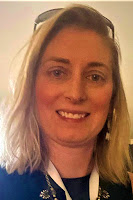As more higher-education journalism programs try to serve community journalism, one professor who started a newspaper with her students, is doing hands-on research and testing a new business model at two weekly papers says the efforts are long overdue.
 |
| Teri Finneman |
"Where the hell has the ivory tower been the last 20 years?" Finneman asked. "We are the ones who should have been leading the research, working with the industry, to avoid this mess that we are in right now. . . . It is time for the ivory tower to step up and support our counterparts in the industry."
Finneman is a researcher of journalism history, but she has launched into doing journalism with her students, as publisher of the Eudora Times in a small town nine miles from her journalism school, which will host "News Desert U." Oct 21-22 for journalism educators to address the crisis. "It is time for universities to step up, finally, and do something about this," she said.
This summer, Finneman is testing a new business model for community papers at Harvey County Now in Newton, Kan., and the Hillsboro Free Press, which will get $10,000 to participate. The model aims to get more revenue from the audience with e-newsletters, events and two tiers of memberships. Kansas Publishing Ventures, which owns the papers, is keeping detailed minutes of its weekly meetings on the project, to help develop an information packet for community papers across the nation, Finneman said.
The model is based on surveys that Finneman and other researches did in Oklahoma, Kansas, Nebraska and the Dakotas, which found that newspaper readers are much more willing to support their papers with money beyond subscriptions that newspaper publishers think they are. In North Dakota, the only state where she has released her results, 40 percent said they were likely or very likely to donate.
Finneman said she and her colleagues were "taken aback" at the attitude of publishers in focus groups who felt that asking for voluntary support would be admitting failure or showing personal weakness. "They very much saw themselves as a business, as opposed to an unreplaceable civic community organization that a newspaper is," while "leaving free money on the table."
She said publishers cited the lack of time and resources for business-model experimentation, but "Overall, there was very much this underlying fear, the fear of doing something different."
 |
| M. Clay Carey |
The summit's "research question" was "How can rural communities sustain local journalism that supports local democracy?" Carey said we need research that is centered on the idea of democratic practice, and the essential role of agency: the ability to act on information. He said research has focused on information at the expense of focus on agency, which many people feel they don't have, and suggested more specific research questions" How can journalistic organizations equip people to be civically engaged? How can they encourage and empower them? Perhaps by "inviting people to participate in sharing their story," he said.
More broadly, he said universities should ask, "How can news organizations facilitate collaboration that creates a sense of community and creates positive change?" and think about facilitating collaboration among local newspapers, national and regional organizations, and local entities such as libraries. He said universities can help create frameworks, and reduce risk and risk aversion. And all the while, do research that is "accessible to people outside the academy. . . . It's easy for research to be an extractive industry, in the same way that journalism can be an extractive industry."
 |
| Bill Reader |
Beyond research, some university journalism programs are trying to help individual papers and the industry at large. University of Georgia students staff The Oglethorpe Echo, a nearby paper that was going to close until retired chain publisher Dink NeSmith created a nonprofit and got the university involved (he described the process in the first Saturday afternoon session); and West Virginia University has the NewStart program to train the next generation of community newspaper owners. Its director, Jim Iovino, reported that the University of Texas is sending someone to see how it can emulate the effort. In both states, newspaper associations asked universities for help because newspaper owners could not find acceptable buyers for their papers.
Further reports on the National Summit on Journalism in Rural America will appear later. Topics will include support from philanthropies and editorial approaches. Previous articles were on the state of rural journalism, the Summit-driven effort for sustainability in rural journalism and nonprofit models.
No comments:
Post a Comment